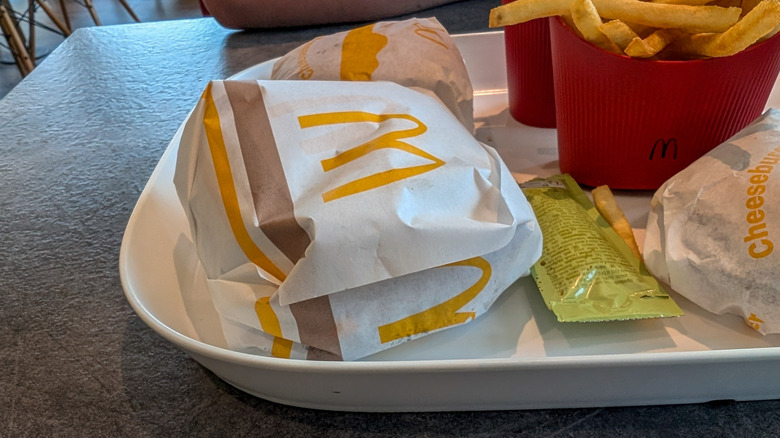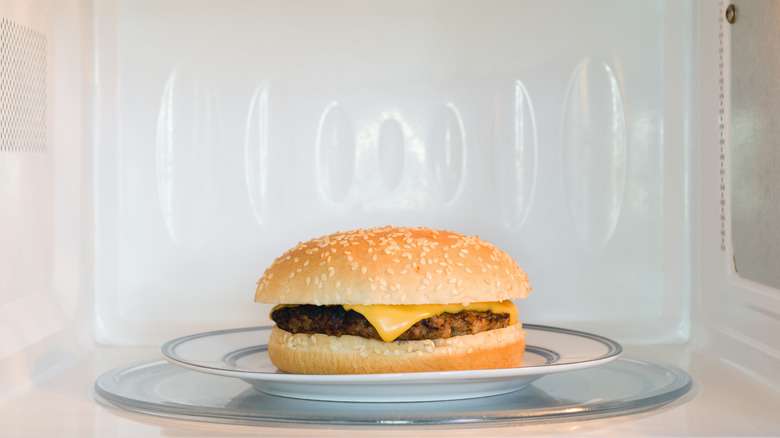Is It Safe To Reheat A McDonald's Burger In Its Original Wrapping?
For a lot of people, the phrase "leftover McDonald's burger" is an oxymoron. Who actually has anything left on their tray after a fast food snack attack? But, assuming it has happened to you — maybe you just got carried away with the hack that creates a cheaper Big Mac from a humble McDouble — you may be left wondering how, exactly, you should reheat the food you bring home. Specifically, you may be considering those tempting burgers, which may still be conveniently contained in a wrapper or clamshell. Can you just stick the whole thing in the microwave?
The answer is not as easy as a yes or a no. In terms of "can," yes — you can microwave the paper wrapper of your Golden Arches haul, and it probably won't catch fire. The cardboard clamshell packaging on your new Quarter Pounder with bacon and BBQ sauce might, however, so let's leave those out of the equation. Otherwise, the food will successfully get hot.
The better question is whether you should do it. The answer: probably not. Despite McDonald's pledging to remove harmful chemicals called PFAs from its packaging at the beginning of the decade, in 2022 Consumer Reports found that these are still very much present in the paper swaddling your double cheeseburger. Supposedly, all PFAs-containing wrapper have been phased out of the U.S. market as of 2024, but the earlier report doesn't exactly inspire confidence. Worse yet, heating the wrapping can easily allow PFAs to leach into your food.
PFAs are an invisible, yet dangerous risk in fast food packaging
Just like there is no such thing as truly microwave-safe plastic, so do many modern paper wrappers contain a constant risk of chemicals that can be released by nuking. PFAs — that's short for per- and polyfluoroalkyl substances – are compounds that are added to paper wrappers to keep greasy food from leaking through. That's a great idea when it comes to managing mess, but there are some potentially serious downsides. For one, these are often called "forever chemicals" because they don't degrade over time and linger indefinitely — including inside your body. The Consumer Reports study noted that the laundry list of risks associated with the ingestion of PFAs included increased cancer risk, hits to your immune system, and even issues with lower birthweight for infants.
In 2020, McDonald's joined the faction of food manufacturers who pledged to eliminate PFAs from its packaging by 2025. In 2022, it claimed that the mission was accomplished. Consumer Reports' independent testing, however, found that McDonald's was on a lengthy list of drive-thru stalwarts that still hid troubling levels of PFAs in wrappers, along with Chick-fil-A, Cava, Burger King, Arby's, and Taco Bell.
The biggest offender at McDonald's was the paper bag used for orders of small fries, but that doesn't mean your burger is strictly safe. Exposing PFA-ridden wrappers to high heat is a great way to make the chemicals transfer into your food. Your best bet is to warm your leftovers on a microwave-safe plate instead.

